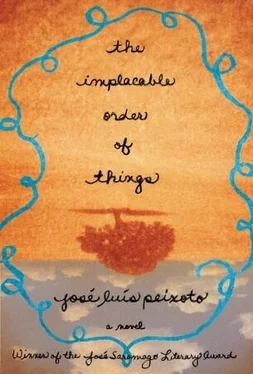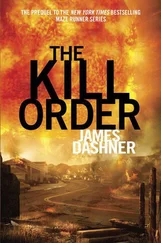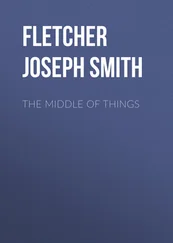WE WEREN’T IN TIME TO catch a ride with the last wagon and we returned to town on foot. Before we’d gone a third of the way, night had fallen. Then the heat wasn’t so bad, but we’ve grown old. My brother has felt a bit put out by my little girl, and I understand; he feels put out by the cook and complains to me, and I understand. I understand, because I know how it is. As surely as I’m standing here, he likes the girl no less than I, who am her father, and he has secretly liked the cook since the day we met her at José’s wedding. I can see it. If we’re alone with the girl, he passes his hand over her face and says coochie-coochie-coo. He plays with her hair. She, intrigued at how we look alike, stares at him with all the attention that a three-month-old can muster, and he, checking to make sure we’re really alone, says coochie-coochie-coo. He doesn’t say anything to the cook, but I see the way he looks at her each time she presents one of her artistic meals. He looks at her with respect, as if congratulating her. I realize it’s hard for him to see the rent money from our house swallowed up month after month by her fancy dishes, but if my brother sometimes remembers this and complains into my ear, I’m sure that he forgets about it more often than not and simply delights in her lunches. And on our way back to town I repeated it to myself and said we’ve grown old. Our legs used to walk this road four or five times a day, back and forth, they walked this road without feeling even half as tired. If we were in a hurry, and young men are always in a hurry to get somewhere and to go from there to somewhere else, and from there to somewhere else; if we were in a hurry, we’d break into a run, and when we reached the town we were fresh as daisies, as if we’d been sitting there gabbing all afternoon. Now our weight weighs heavy on our legs. We watch where we place our feet, careful not to fall, for if we broke a leg it would be our death. We feel an invisible shaking in our legs, and lately that shaking has doubled and is noticeable in our gaze. Our bones don’t bend the way they used to. Even our breathing is different from what it was. It used to be continuous, it was something we didn’t notice. Now it takes more effort to breathe in, and when we breathe out we make an asthmatic sound, as if our throats were partly obstructed or we’d swallowed a rusty harmonica. Dead tired, we reached the town and our house. The baby was sleeping. She won’t sleep a wink during the night, said my brother. The cook helped us take off our boots and unbend our toes. Since the baby’s schedule was topsy-turvy, ours was too, and in spite of it being still early we had dinner. We sat down and the cook asked me does this day remind you of anything special? I stopped to think and couldn’t remember anything special. My brother whispered into my ear that maybe it was our one-year wedding anniversary. Indeed it was. Smiling like a teenager, the cook presented a dish just for me that was an infinite spiral in the shape of a heart. It was made of mushrooms that my brother had picked and with strips of sirloin that must, on their own, have cost almost a month’s rent. It was flavored with such an extravagant blend of spices that I couldn’t identify a single one. It was one of the tastiest meals I’ve ever eaten. I ate the whole thing. I wiped my mouth on the back of my hand, and the cook slipped around me and whispered I love you. I smiled. Although I was exhausted and in spite of the baby waking up every fifteen minutes, that night we made love more than once.
EARLY IN THE MORNING Moisés went into the backyard. He squatted next to a cabbage and began to defecate. He laboriously wiped himself clean and got up. His sleepy brother waited and then asked do you have a stomachache? They went back to bed, and on the way to the oil press, they made no mention of what had happened. Moisés, if possible, felt even more worn out than the day before. The discomfort of being enervated only torments the flesh after a night of sleep, and that was how Elias explained the weariness that his brother felt in his limbs. The eaves of the houses still cast a shadow, and the brothers, bent forward, walked under this strip of shelter. They walked without seeing the streets. No one had taken notice, but since Moisés had gotten married, the brothers always walked to the door of their old house, from where they turned and followed the path they’d always taken to the oil press. It was useless to go by way of their old house, which lay in the wrong direction, but that’s what they did. They did it not out of superstition but out of habit. And this time the whitewashed houses were so sad as they desperately tried in vain to talk to the brothers. It was as if they wished to catch their attention at all costs. It was as if they wished to say goodbye to the brothers and already missed them. The whitewashed houses that the brothers passed every day. Bonds are formed between eternal things, and the brothers passing by those houses every day was as eternal as the white lime coating their walls. The houses’ memory had gotten used to the brothers’ slow passing, as it had gotten used to the sky and used to the sun. The accumulated moments of when the brothers passed by, on that unchanging path before each house, added up to a lot of time, even in the life of a house. And tears of white light ran down the walls as the brothers passed by.
Before the gate of the oil press, they both straightened up as much as they could, but it was Moisés who took the key from his pocket and inserted it into the lock. Then another lock. The cadenced voice of a lament dripped from the oil tanks like the cry of a mother weeping for a child, a cry of black despair, embodied in the sound of the oil drops. Blackness was what Moisés and Elias felt. As if they had entered a tunnel, they perceived deep within, ever deeper, that something was approaching that would separate them. They could read, deep down, that this moment stood waiting for them in the future and that time was burning, going up in smoke before their eyes. At the same time and with the same images, and with the same words, the brothers remembered what they were leaving behind: the little girl, the cook, the face of their father etched in their memory, what they had heard and imagined about their mother. They remembered the little girl waking up at night and falling back asleep in their four intertwined arms; the girl closing her eyes and truly knowing, more than she’d ever know if she were grown up, that they loved her. The cook, sitting by the fire and watching them eat, more gratified than if she herself were eating; happy, the way a man wishes the woman he loves to be happy. Their father, who taught them half of life and who died with his eyes fixed on them, as if he had nothing but them and was proud of what he had achieved. And their mother, whom they’d never even seen in a picture but whom they both could see in their minds: very young, with curly hair and large brown eyes. Everything that they were leaving behind, the mornings when the sun was mild, the path to the oil press; it all crowded into their memory, for the thing that would separate them was approaching: much worse than the man who pulls teeth with pliers, worse than a whetted knife separating them, worse than scissors. The morning was rising over the streets of the town and the plains that surrounded it, but in the oil press a still silence grew darker.
They sat there without speaking. Each looked in a different direction, at nothing. Behind their sad faces, they pondered. In his mind Moisés said words to his brother, hoping they’d be heard; in his mind he said it will be an instant and bring solitude. For the first time we’ll shout each other’s name. We’ve never needed to call each other by name, have you noticed? I don’t know how my name sounds in your voice. In your voice, brother. Brother. I don’t know how your name sounds in my voice. For the first time we’ll shout each other’s name, and our despair will be the prelude to a painful sorrow that we’ll get used to, as a man without a heart gets used to the black void in his chest. You’ve always lived in my life, and I’ve always been with you when you smiled. Today we’ll know solitude. We’ll vanish from each other’s life. But we won’t forget. And to remember will be the greatest suffering, to remember what we were wherever we end up and not to be able to be anything anymore. To remember speaking in the way that only we spoke and to remain with that language in our heads, that way of speaking which we’ll never use with anyone else. Today I’ll leave you, knowing that I’ve always loved you for you having always been with me. And I’m no longer ashamed of that word we never said, love, that word, love, which we never once said but which today I need to say. Sincere, true, brother. I’ll miss you. With no one to explain it to, since I’ll have no one at my side, I’ll miss you. And however black the plain may be where I’ll roam for eternity, it will always be the painful memory of a sunset, it will always be the grief of only being able to remember you.
Читать дальше












